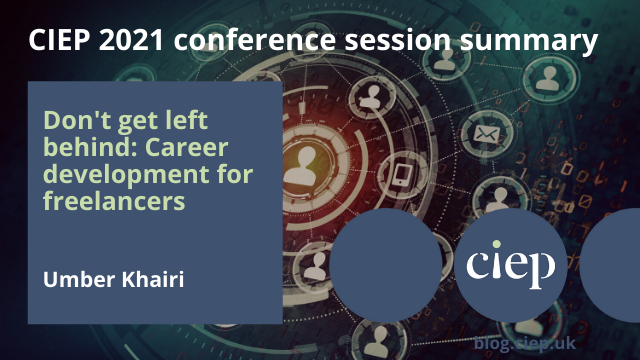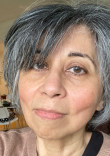This year’s CIEP conference was held online, from 12 to 14 September. Attendees from all over the world logged on to learn and socialise with their fellow editors and proofreaders, and a number of delegates kindly volunteered to write up the sessions for us. Umber Khairi reviewed Don’t get left behind: Career development for freelancers, presented by Suzanne Collier.
 Suzanne Collier is both a Careers Adviser as well as somebody with many years of experience in book publishing, so this was a very useful conference session for CIEP members – particularly those who are new to freelance work or who have recently set up their own businesses.
Suzanne Collier is both a Careers Adviser as well as somebody with many years of experience in book publishing, so this was a very useful conference session for CIEP members – particularly those who are new to freelance work or who have recently set up their own businesses.
Suzanne said that most of the freelancers who contact her for career advice have one main question: how can we keep up to date? She said that this is a major concern because of the ‘overwhelming speed’ with which the industry is changing and technology is advancing: ‘Publishing almost got dragged into the twentieth century and is now sort of speeding through the twenty-first.’
She pointed out that freelancers can often feel isolated and invisible, so it’s easy for them to feel hard done by and get left behind. However, the key thing is to remind yourself that this is a job, your job, and you have to make an effort to update skills and keep abreast of developments within the industry. Suzanne emphasised the importance of taking responsibility for your development, and with the availability of many free resources, this does not have to be an expensive proposition.
She said that social media – despite sometimes being a ‘cesspit of hell’ – is a great resource, adding that you need to make it work for your business by finding the right people or organisations to link to. Suzanne advised that you follow publishers, individuals and organisations who are relevant to your business and then stay informed of what they talk about or do.
Suzanne also spoke about the importance of LinkedIn and gave some very clear advice on things that do not work on this platform. These include what you write in your bio: for example, she said you should not put in vague terms like ‘publishing professional’ or write ‘I help people to …’ but instead be specific and focus on keywords and skills. And don’t just wait around till people contact you via LinkedIn, but engage with others on the platform.
Suzanne reminded freelancers that they need to make an active effort to remain connected to their industry by joining networks and by knowing what is happening in their field. She recommended signing up for free news updates relating to their relevant industry, so for example, for book publishing she mentioned Bookseller, BookBrunch, Publishers Weekly and Publishers Lunch.
Another way of keeping abreast of what’s happening in your field is by attending events; this, she said, you should regard as CPD. At this point in the talk, we learned that many years ago Suzanne was a certified aerobics instructor and she cited the example of being required to have a certain number of hours of training/teaching to keep her aerobics accreditation updated. Freelancers, she said, should use this same logic and invest the time and money needed to attend events like book fairs or conferences – in other words, treat this as part of keeping their ‘accreditation’ current. She said book fairs were a great place to see ‘what was going on and who’s who’ and to meet people in the profession. She mentioned that the Frankfurt Book Fair might be partly virtual this year, so that may be a good opportunity for many people who might otherwise not be able to attend.
Suzanne also pointed out that being thorough in one’s work should extend to researching potential clients as well as industry trends. She said freelancers need to know what is happening in, say, a particular publishing house or genre and suggested making regular visits to bookshops and libraries to see what’s being produced, what it looks like in the finished form and how it’s being marketed.
In terms of free resources, Suzanne mentioned Google Digital Garage (where you can get free online certification for Google products), Codecademy and Coursera and said it was a good idea to check what was available in terms of Adobe training and also to check out the Independent Publishers Guild (IPG) Skills Hub. Here, she also said that although the LinkedIn training, Lynda is paid-for training, free trials of this are often available so it’s worth checking on this.
The main thing that Suzanne stressed throughout this conference session was that keeping up to date is not just about updating your tech skills, it is about keeping informed and aware of what is happening in your industry – of the trends (whether in terms of tech or genre), debates, products and other developments – and looking for resources and networks that can inform and educate you. She also identified podcasts as a very useful resource and gave the example of the Extraordinary Business Book Club as one such podcast. Suzanne herself has a weekly careers podcast on her website Bookcareers.com and she recommended that, as an editing and proofreading professional, you should look for, and identify, podcasts that are relevant to your work.
Later on in the session, she answered a question many of us ponder: ‘How important is having a niche area to one’s career progression and opportunities?’ Suzanne’s view was that while this could help you in some ways it could also hinder you and that it was probably better to ‘have some niche areas but also to keep editorial skills transferable’.
This was an inspiring session as it was a reminder of the many advantages of being a freelancer – you get to design and direct your CPD and develop your networks with no office politics or annoying boss being involved! However, as Suzanne Collier made clear in her talk, you do need to be proactive in this and not let yourself become complacent.
 Umber Khairi is a new CIEP member and has a background in journalism (print, then news websites, then radio). She took early retirement from the BBC in 2018 and she is co-founder of the independent, journalist-owned magazine, Newsline, in Pakistan. She is a compulsive proofreader. Areas of interest include South Asia, Islamic culture, the news media, current affairs, new fiction and health and nutrition.
Umber Khairi is a new CIEP member and has a background in journalism (print, then news websites, then radio). She took early retirement from the BBC in 2018 and she is co-founder of the independent, journalist-owned magazine, Newsline, in Pakistan. She is a compulsive proofreader. Areas of interest include South Asia, Islamic culture, the news media, current affairs, new fiction and health and nutrition.
 About the CIEP
About the CIEP
The Chartered Institute of Editing and Proofreading (CIEP) is a non-profit body promoting excellence in English language editing. We set and demonstrate editorial standards, and we are a community, training hub and support network for editorial professionals – the people who work to make text accurate, clear and fit for purpose.
Find out more about:
Posted by Abi Saffrey, CIEP blog coordinator.
The views expressed here do not necessarily reflect those of the CIEP.
